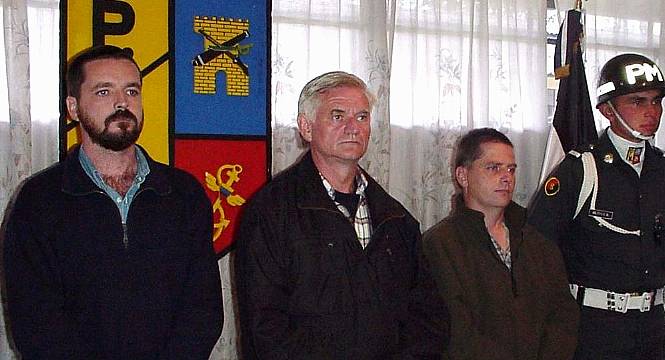A suggestion that three republicans were on holiday in Colombia rather than training rebels was said to be “insulting to (the) intelligence” of diplomats, archive documents show.
There was concern at the time that the arrest of the so-called Colombia Three in 2001 could damage the Northern Ireland peace process.
The incident happened after the IRA agreed on a way of disabling its arsenal, following months of slow progress.
Colombian authorities alleged that the men were training members of the Revolutionary Armed Forces of Colombia, also known as Farc.
The men were convicted of training rebels and sentenced to 17 years in prison in 2004; they were granted amnesty in 2020 as part of Colombia’s peace process.
In 2022, it was reported that their amnesty had been revoked.
The Colombia Three have always denied wrongdoing, maintaining they were in the country to observe Colombia’s peace negotiations.
The three men, who were travelling on false passports, Niall Connolly, James Monaghan, and Martin McCauley, were arrested on August 11th, 2001, at Bogota International Airport.
In newly released State documents, the discussion between top Irish and US officials in the aftermath of the arrests show that the US Special Envoy for Northern Ireland Richard Haass was angry at the incident.
In a meeting between Mr Haas and Ireland’s Ambassador to the US Sean O hUiginn, he said the men were “not on vacation, they were not promoting a peace process”.
“It was not only implausible to try to put across such explanations but insulting to our intelligence.
“A far better course would be to admit that a mistake had been made and say that it would not happen again.
“It was far more likely that the detainees were involved in some kind of ‘transfer of knowhow about bomb-making’.”
A briefing document written for the Department of Foreign Affairs detailed a meeting in Washington DC between Mr Haass and Ireland’s Ambassador to the US Sean Ó hUiginn.
The document notes that the Irish and British governments were “obviously in stocktaking mode to work out a strategy in relation to developments in the peace process, including of course the Colombia dimension”.
“The benign explanation that the three might have been engaged in peace education was not sustainable.
“Rather the choice was from the malign menu, for example, of some kind of weapons dealing, testing or training,” the note dated September 7th, 2001 said.
The material can be viewed in the National Archives in file 2023/53/29







